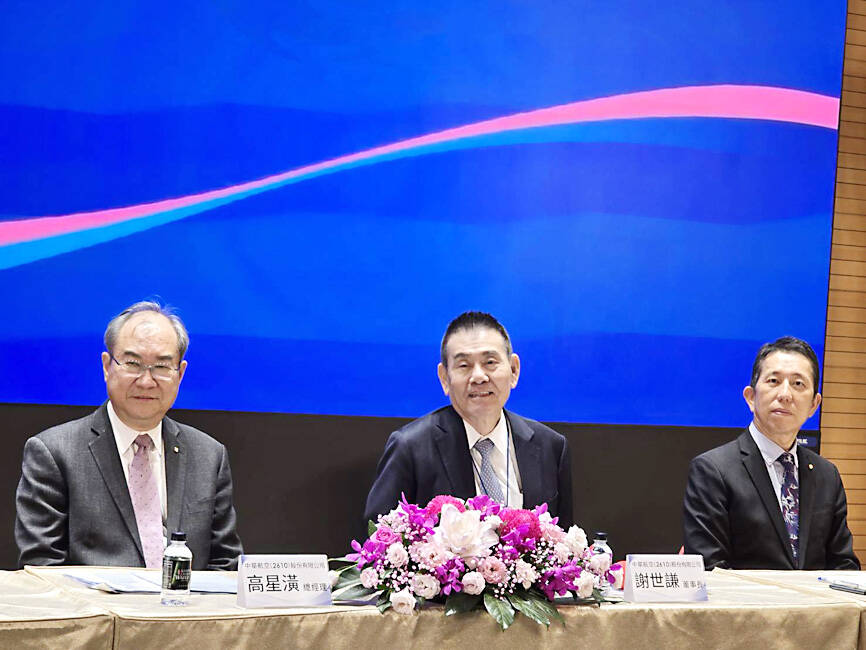China Airlines Ltd (CAL, 中華航空) yesterday said it is optimistic about next year’s business outlook, as the airline continues to renew its fleet on expectations that global passenger traffic would maintain steady growth and air cargo demand would remain strong.
From next year to 2028, the airline is to welcome a new Boeing Co 787 fleet — 18 787-9 and six 787-10 passenger aircraft — to cover regional and medium to long-haul destinations, CAL chairman Hsieh Shih-chien (謝世謙) said at an investors’ conference in Taipei.
The airline would also continue to introduce Airbus SE 321neo passenger planes and Boeing 777F cargo jets, Hsieh said.

Photo: Wang Yi-hung, Taipei Times
With the phase-out of the Boeing 744F freighter fleet and the full deployment of the 777F cargo jets, along with the addition of 787 belly cargo capacity, CAL aims to further enhance its freight capacity and revenue, the company said in an earnings report.
However, the airline said its passenger capacity has only reached 80 percent of pre-COVID-19 pandemic levels, causing ticket prices to rise by 20 to 30 percent. Moreover, the international aviation industry’s supply chains are still way behind on their ability to manufacture new planes, it said.
Hsieh said this situation might continue for another three years and would not ease up until 2027 at the earliest.
“Delivery delays might become the norm,” he said.
Supply and demand would continue to be tight next year, which would further drive up ticket prices.
“As long as passenger traffic remains strong, the overall outlook is still positive,” he said.
Global passenger traffic has been on a steady climb since April 2021, with the International Air Transport Association (IATA) projecting an annual 11.6 percent increase in passenger traffic this year. The Asia-Pacific region is expected to achieve double-digit growth in passenger traffic this year and next, leading other regions, the IATA forecast.
Meanwhile, global trade growth, economic recovery and constraints on maritime shipping capacity have driven continued growth in air cargo demand, with international air cargo demand this year likely to increase 15 percent compared with last year and air cargo volume to grow 5 percent, the IATA said in June.
CAL reported that net profit in the third quarter grew 66.6 percent year-on-year to NT$3.83 billion (US$117.5 million) and earnings per share (EPS) rose 65.8 percent to NT$0.63.
Revenue in the quarter increased 9.09 percent annually to NT$52.02 billion, with passenger business sales edging up 0.7 percent to NT$26.87 billion, while cargo business sales climbed 20.5 percent to NT$15.71 billion, the airline said.
In the first three quarters, total net profit reached a record NT$10.37 billion, up 50.3 percent from a year earlier. EPS increased 48.7 percent to NT$1.71 year-on-year, CAL said.
Cumulative revenue over the period totaled NT$150.93 billion, up 9.7 percent, with passenger business sales growing 12.15 percent to NT$97.15 billion and cargo business sales up 1.02 percent to NT$42.86 billion, it said.
Passenger and cargo revenue maintained steady growth, especially in Northeast Asia, Southeast Asia and long-haul flights, CAL said.

Sweeping policy changes under US Secretary of Health and Human Services Robert F. Kennedy Jr are having a chilling effect on vaccine makers as anti-vaccine rhetoric has turned into concrete changes in inoculation schedules and recommendations, investors and executives said. The administration of US President Donald Trump has in the past year upended vaccine recommendations, with the country last month ending its longstanding guidance that all children receive inoculations against flu, hepatitis A and other diseases. The unprecedented changes have led to diminished vaccine usage, hurt the investment case for some biotechs, and created a drag that would likely dent revenues and

Global semiconductor stocks advanced yesterday, as comments by Nvidia Corp chief executive officer Jensen Huang (黃仁勳) at Davos, Switzerland, helped reinforce investor enthusiasm for artificial intelligence (AI). Samsung Electronics Co gained as much as 5 percent to an all-time high, helping drive South Korea’s benchmark KOSPI above 5,000 for the first time. That came after the Philadelphia Semiconductor Index rose more than 3 percent to a fresh record on Wednesday, with a boost from Nvidia. The gains came amid broad risk-on trade after US President Donald Trump withdrew his threat of tariffs on some European nations over backing for Greenland. Huang further

CULPRITS: Factors that affected the slip included falling global crude oil prices, wait-and-see consumer attitudes due to US tariffs and a different Lunar New Year holiday schedule Taiwan’s retail sales ended a nine-year growth streak last year, slipping 0.2 percent from a year earlier as uncertainty over US tariff policies affected demand for durable goods, data released on Friday by the Ministry of Economic Affairs showed. Last year’s retail sales totaled NT$4.84 trillion (US$153.27 billion), down about NT$9.5 billion, or 0.2 percent, from 2024. Despite the decline, the figure was still the second-highest annual sales total on record. Ministry statistics department deputy head Chen Yu-fang (陳玉芳) said sales of cars, motorcycles and related products, which accounted for 17.4 percent of total retail rales last year, fell NT$68.1 billion, or

MediaTek Inc (聯發科) shares yesterday notched their best two-day rally on record, as investors flock to the Taiwanese chip designer on excitement over its tie-up with Google. The Taipei-listed stock jumped 8.59 percent, capping a two-session surge of 19 percent and closing at a fresh all-time high of NT$1,770. That extended a two-month rally on growing awareness of MediaTek’s work on Google’s tensor processing units (TPUs), which are chips used in artificial intelligence (AI) applications. It also highlights how fund managers faced with single-stock limits on their holding of market titan Taiwan Semiconductor Manufacturing Co (TSMC, 台積電) are diversifying into other AI-related firms.